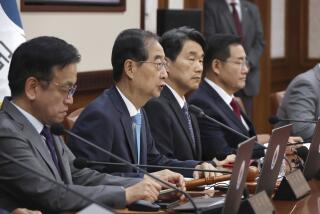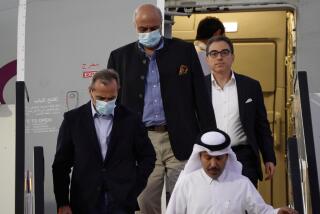North Korea Walks Out on Nuclear Talks : Diplomacy: Pyongyang blames U.S. for failure. Regime resists bid to send them reactors from South.
- Share via
WASHINGTON — North Korea walked away from talks with the United States on Friday, throwing into doubt the future of an agreement signed last October that brought Pyongyang’s nuclear program to a halt.
Under the deal, the United States and its allies were supposed to provide North Korea with two light-water nuclear reactors to be used for civilian purposes. But the deal is now stuck over North Korea’s insistence that the reactors not come directly from South Korea, its longtime enemy.
Friday was the date by which the United States was to conclude a supply contract with North Korea for the reactors, which would replace its existing gas-graphite reactor. Instead, six months after the triumphal announcement of the deal, both Washington and Pyongyang are locked in a new diplomatic showdown.
After an unsuccessful round of working-level talks in Berlin, North Korean officials flew home Friday, ostentatiously rebuffing U.S. overtures to continue the discussions.
The Clinton Administration quickly offered them a new round of higher-level talks in Geneva with Ambassador Robert L. Gallucci, the chief U.S. negotiator of the nuclear deal. “It is not an insoluble problem,” Secretary of State Warren Christopher told reporters in Washington.
*
Administration officials have said repeatedly that, as long as North Korea does not start its reactor again, the United States is willing to keep talking about finding ways to go through with the deal.
But if the reactor is restarted, U.S. officials have warned publicly, the Clinton Administration will consider seeking U.N. economic sanctions against North Korea.
Such a move by Pyongyang would also put an end to direct negotiations between Washington and North Korea, Administration officials have suggested.
“If they break the freeze, everything is off the table,” a senior U.S. official told The Times last month.
Pyongyang may not want to completely call off the negotiations, as they have been the channel through which it has obtained the first moves toward diplomatic recognition from the United States. The talks have also helped North Korea to begin to upgrade its ties with Japan and other Asian countries.
“I do not know what (the North Koreans) are going to do,” Gallucci told reporters at a news conference Friday.
*
Before leaving Berlin, chief North Korean negotiator Kim Jong U suggested that Pyongyang would not consider the U.S. proposal for further talks in Geneva.
“We think everything that could be discussed in high-level talks has already been discussed and settled,” Kim told reporters. “The U.S. side is to blame for the rupture, for the breakdown and the rupture of the current talks because of the unreasonable and unrealistic attitudes.”
North Korea’s existing nuclear program includes one five-megawatt nuclear reactor, which by CIA estimates has already produced enough plutonium to make one or two nuclear bombs, as well as enough spent nuclear fuel that, if reprocessed, would make several more bombs. Light-water reactors do not produce weapons-grade plutonium.
In addition, North Korea had been developing two much larger nuclear reactors, which could have produced much larger volumes of plutonium. These reactors have not been completed.
More to Read
Sign up for Essential California
The most important California stories and recommendations in your inbox every morning.
You may occasionally receive promotional content from the Los Angeles Times.













